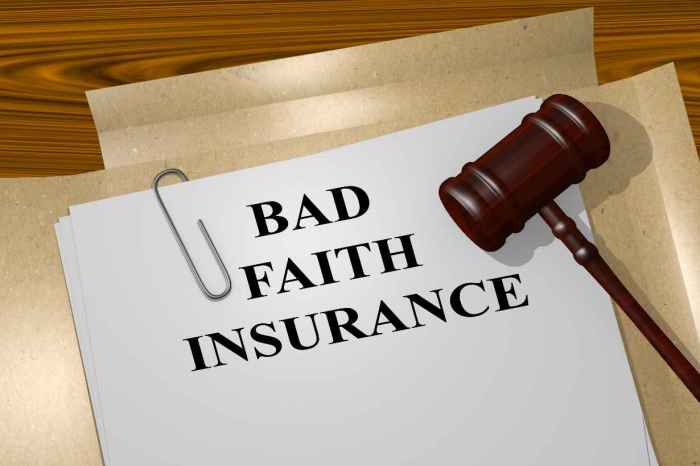
How to sue insurance company for bad faith – How to sue an insurance company for bad faith? It’s a question that’s probably crossed your mind if you’ve been dealing with a frustrating insurance claim. Maybe your claim was denied for no good reason, or the insurance company is dragging their feet, refusing to pay out what you’re owed. It can feel like you’re stuck in a game of “who can out-wait who,” and it’s a game you might not want to play. This article will give you the lowdown on what bad faith insurance practices are, how to spot them, and what steps you can take to fight back.
Insurance companies are supposed to be there for you when you need them, but sometimes they act in their own self-interest, leaving you to fend for yourself. Understanding the concept of bad faith and how to identify it is the first step in getting the compensation you deserve. We’ll walk you through the process of building a strong case, finding legal representation, and navigating the legal system. We’ll also share some tips for protecting yourself and your rights. So, if you’re ready to take on the insurance giants, read on!
Understanding Bad Faith Insurance Practices
Imagine this: you get into a car accident, file a claim with your insurance company, and then… crickets. They stall, give you the runaround, or lowball you with a ridiculously low settlement. This, my friend, is the shady world of bad faith insurance practices.
Examples of Common Bad Faith Practices
Bad faith insurance practices can be as diverse as the insurance companies themselves, but some common bad faith tactics include:
- Denying a claim without a valid reason: This is a big no-no. Insurance companies are obligated to investigate claims fairly and honestly. If they deny a claim without good reason, it could be a sign of bad faith.
- Delaying the processing of a claim: This is another classic bad faith tactic. Insurance companies may delay processing your claim in hopes that you’ll get frustrated and give up.
- Lowballing a settlement: This is when the insurance company offers you a ridiculously low settlement for your claim, hoping you’ll take it just to get something.
- Misrepresenting the terms of your policy: Insurance companies may try to trick you by misrepresenting the terms of your policy, leading you to believe you’re not covered when you actually are.
- Failing to communicate effectively: Insurance companies should keep you informed about the status of your claim, but sometimes they intentionally fail to communicate or provide misleading information.
Legal Implications of Bad Faith Insurance Practices
Bad faith insurance practices are serious business. If you can prove your insurance company acted in bad faith, you could be entitled to a lot more than just the original amount of your claim. This could include:
- Punitive damages: These are damages awarded to punish the insurance company for their bad behavior.
- Attorney’s fees: You can recover the costs of hiring an attorney to fight your case.
- Emotional distress damages: You may be able to recover damages for the emotional distress caused by the insurance company’s bad faith actions.
Identifying Potential Bad Faith Scenarios
You’ve got a claim, you’ve done your part, but the insurance company seems to be dragging their feet. They might be giving you the runaround, or maybe they’re just plain ignoring you. It’s time to consider if they’re playing fair or trying to pull a fast one on you. Identifying bad faith scenarios can be tricky, but understanding the signs can help you fight back and get the compensation you deserve.
Examples of Bad Faith Insurance Practices
Bad faith can take many forms, and recognizing these practices is crucial for taking action. Here are some common scenarios where insurance companies might be acting in bad faith:
- Unreasonable Delays in Processing Claims: You’ve filed a claim, but the insurance company is taking forever to review it, or they’re constantly asking for more information even though you’ve provided everything they’ve requested. This could be a sign of bad faith, especially if you’re facing mounting medical bills or other expenses. Imagine you’re in a car accident, and the insurance company takes months to decide if they’ll cover your medical expenses. That’s a clear case of delaying tactics.
- Lowballing Settlement Offers: The insurance company might offer you a settlement that’s significantly lower than what your claim is actually worth. They might try to pressure you into accepting a low offer by claiming that’s all you’re entitled to. For example, if your car was totaled, the insurance company might offer you a settlement that’s way below the actual value of your car. Don’t be bullied into accepting a low offer without knowing your rights.
- Denying Legitimate Claims: The insurance company might try to find any excuse to deny your claim, even if it’s clearly covered under your policy. They might claim your claim is fraudulent or that it’s not covered, even if you have all the necessary documentation. This can be especially frustrating if you’ve paid your premiums on time and have a history of good claims.
- Failing to Investigate Claims Thoroughly: The insurance company might not be doing a proper investigation of your claim. They might not be contacting witnesses or obtaining necessary medical records. This can lead to an inaccurate assessment of your claim and a denial of benefits.
The Role of State Laws and Regulations
State laws play a critical role in defining bad faith insurance practices. Each state has its own set of laws that govern how insurance companies must handle claims. These laws can vary significantly from state to state, so it’s important to understand the specific laws in your state.
Many states have specific laws that address bad faith insurance practices. These laws often define what constitutes bad faith and Artikel the penalties that insurance companies can face if they engage in bad faith practices. For example, some states allow policyholders to sue insurance companies for bad faith and recover additional damages, such as punitive damages.
“Insurance companies are supposed to be there to help you when you need them most. But sometimes, they try to take advantage of you. Knowing your rights and understanding the signs of bad faith can help you fight back and get the compensation you deserve.”
Building a Strong Case for Bad Faith

Okay, so you’ve got a bad faith claim brewing, and you’re ready to take your insurance company to the cleaners. But before you unleash your inner John Wick on their corporate headquarters, you need to build a rock-solid case. Think of it like assembling a killer playlist for your courtroom showdown.
Key Elements of a Bad Faith Claim
Proving bad faith isn’t just about showing that your insurance company messed up. You need to show they intentionally acted like a total jerk to screw you over. Here’s the scoop on what you need to prove:
- The Insurance Company Had a Duty to Act in Good Faith: Think of it like a promise they made to be cool and fair. They’re legally obligated to handle your claim with reasonable care and honesty.
- The Insurance Company Violated That Duty: This is where you bring out the evidence. Did they delay your claim for no good reason? Deny it without a solid reason? Or try to lowball you with a ridiculous settlement offer? These are all signs they might have broken their promise.
- You Suffered Damages: Did you lose money, time, or even your peace of mind because of the insurance company’s bad faith? You need to prove these damages to get your due compensation.
Gathering Evidence to Support Your Claim
Now that you know what you need to prove, it’s time to gather the evidence to back up your claims. Think of it like building a case file for your legal detective agency.
- Document Everything: This is like your secret weapon. Keep a detailed record of every single interaction with the insurance company. That includes emails, phone calls, letters, and even text messages. Don’t forget to save all the dates and times.
- Get It in Writing: Always try to get things in writing, like claim denials, settlement offers, and any other important information. It’s like having a written confession from the insurance company.
- Gather Supporting Documents: Collect any evidence that supports your claim, like medical bills, repair estimates, and even photos of the damage. Think of it like a photo album of your bad faith saga.
- Don’t Be Afraid to Ask: If you need clarification on anything, don’t be shy about asking. Document your questions and the insurance company’s responses. Remember, knowledge is power.
The Importance of Documentation
You know that saying, “If it ain’t documented, it didn’t happen”? Well, it’s even more important when you’re dealing with bad faith insurance practices. Think of documentation as your insurance company’s kryptonite.
“Documentation is like the golden ticket to winning your bad faith claim. It’s your proof that they were acting shady and unfair.”
- Detailed Records: Don’t just jot down a quick note. Get into the nitty-gritty details. What did you talk about? What did the insurance company say? What did they promise?
- Accurate Dates and Times: This is crucial for establishing a timeline of events and proving when the insurance company went rogue.
- Keep It Organized: Create a system for storing your documents so you can easily access them. Think of it like a filing system for your insurance company’s bad behavior.
Seeking Legal Representation

Okay, so you’ve got a bad faith insurance claim, and you’re ready to fight back. But before you go charging into battle, you need a solid game plan, and that’s where a lawyer specializing in insurance bad faith comes in.
Benefits of Hiring a Bad Faith Insurance Attorney
Think of a bad faith insurance lawyer as your personal superhero. They’ve got the powers to navigate the complex legal landscape and stand up to the insurance giants. Here’s why you need one on your team:
- Know the Rules of the Game: Insurance companies have a whole playbook of tricks and tactics. A bad faith lawyer knows these moves and can anticipate their next play. They understand the legal nuances of bad faith claims and can spot violations of state laws and regulations.
- Fight for Your Rights: Insurance companies often try to downplay your claim or offer a lowball settlement. Your lawyer will advocate for you, making sure you get the compensation you deserve. They’ll negotiate with the insurance company and fight for your rights in court if necessary.
- Save You Time and Money: Dealing with insurance companies can be a time-consuming and stressful process. A lawyer will handle the heavy lifting, freeing you to focus on other things. They can also help you avoid costly mistakes that could hurt your case.
- Increase Your Chances of Success: Let’s face it, insurance companies have deep pockets and legal teams. You need a lawyer who can level the playing field and give you a fighting chance. A lawyer specializing in bad faith claims has the experience and expertise to build a strong case and increase your chances of winning.
Finding a Qualified Attorney
Finding the right lawyer is like finding the perfect sidekick. You need someone who’s got your back and understands your needs. Here’s how to find a qualified attorney:
- Get Recommendations: Ask friends, family, or colleagues for recommendations. Check online reviews and ratings websites like Avvo or Martindale-Hubbell.
- Contact the Bar Association: Your state bar association can provide a list of attorneys who specialize in insurance bad faith claims. They can also give you information about their qualifications and experience.
- Look for Expertise: Make sure the lawyer you choose has experience handling insurance bad faith cases. Look for someone who has a proven track record of success in these types of cases. Check their website, publications, and past cases to assess their expertise.
- Schedule Consultations: Meet with several attorneys to discuss your case and get a feel for their approach. Ask them about their fees, their experience, and their strategy for handling your claim.
Role of an Attorney in Handling Bad Faith Claims
Your bad faith lawyer is like your personal coach, guiding you through the entire process. Here’s how they’ll help:
- Investigate Your Claim: Your lawyer will gather evidence to support your claim, including medical records, police reports, and witness statements. They may also hire experts to assess your damages and determine the extent of your losses.
- Communicate with the Insurance Company: Your lawyer will be your main point of contact with the insurance company. They will handle all communication, including negotiating settlements and responding to any demands or requests for information.
- File a Lawsuit: If the insurance company refuses to settle your claim fairly, your lawyer will file a lawsuit on your behalf. They will prepare all the necessary documents and represent you in court.
- Prepare for Trial: If your case goes to trial, your lawyer will prepare you for testimony, gather evidence, and present your case to the jury. They will also argue your case before the judge and fight for your rights throughout the legal process.
Understanding the Legal Process

Taking legal action against an insurance company for bad faith can be a complex and lengthy process. But, armed with the right information, you can navigate the legal landscape and fight for the compensation you deserve.
Steps Involved in Filing a Bad Faith Lawsuit, How to sue insurance company for bad faith
Filing a bad faith lawsuit is a multi-step process. You’ll need to follow the proper procedures to ensure your claim is heard. Here’s a breakdown of the key steps involved:
- Demand Letter: You’ll start by sending a formal demand letter to the insurance company, outlining your claim and the reasons you believe they acted in bad faith. This letter serves as a notice and gives the insurance company a chance to rectify the situation.
- Filing a Complaint: If the insurance company doesn’t respond to your demand letter or fails to address your concerns, you can file a lawsuit in the appropriate court. The complaint will detail the facts of your case and the specific allegations of bad faith.
- Discovery: This phase involves gathering evidence to support your case. Both you and the insurance company can request documents, conduct depositions, and issue interrogatories to gather information.
- Negotiation: Both sides may attempt to reach a settlement agreement outside of court.
- Trial: If no settlement is reached, the case will proceed to trial. You’ll present your evidence to a judge or jury, who will decide whether the insurance company acted in bad faith and determine the appropriate damages.
Potential Outcomes of a Bad Faith Lawsuit
The outcome of a bad faith lawsuit can vary depending on the specific circumstances of the case. Here are some possible outcomes:
- Settlement: The insurance company may agree to settle the case for a certain amount of money. This is the most common outcome, as it avoids the costs and uncertainties of a trial.
- Judgment in Your Favor: The court may find that the insurance company acted in bad faith and award you damages.
- Judgment in Favor of the Insurance Company: The court may find that the insurance company did not act in bad faith.
Types of Damages Awarded in Bad Faith Cases
If you win a bad faith lawsuit, you may be awarded various types of damages. These can include:
- Economic Damages: These are damages that are easily quantifiable, such as lost wages, medical expenses, and property damage.
- Non-Economic Damages: These are damages that are more difficult to quantify, such as pain and suffering, emotional distress, and loss of consortium.
- Punitive Damages: These are damages awarded to punish the insurance company for its egregious conduct and deter future bad faith behavior.
Resources and Additional Information: How To Sue Insurance Company For Bad Faith
You’re ready to fight back against an insurance company that’s been playing dirty? Good for you! But before you go full-on “John Wick” on them, let’s make sure you’ve got all the tools you need. This section will give you the lowdown on where to find the right resources and information to make your case rock-solid.
Reputable Legal Resources and Organizations
Think of these resources as your trusty sidekicks, providing you with the intel you need to take on the insurance giant. They’re chock-full of information on insurance bad faith and can help you navigate the legal landscape.
- National Association of Insurance Commissioners (NAIC): This organization is like the Avengers of insurance regulation. They work to protect consumers and ensure fair insurance practices across the US. You can find tons of information on their website, including state-specific resources and regulations. https://www.naic.org/
- Consumer Federation of America (CFA): This group is all about protecting consumers’ rights, including those related to insurance. They offer valuable resources, research, and advocacy on insurance bad faith issues. https://www.consumerfed.org/
- National Consumer Law Center (NCLC): This organization is a powerhouse when it comes to consumer law. They have a wealth of information on insurance bad faith, including case studies and legal briefs. https://www.nclc.org/
Consumer Protection Agencies
These guys are the first line of defense against shady insurance practices. They can investigate complaints, mediate disputes, and even take legal action against insurance companies.
- Your State Insurance Department: This is the go-to place for insurance-related issues in your state. They can help you file a complaint, investigate a claim, or provide information on your rights. To find your state insurance department, check the NAIC website.
- The Federal Trade Commission (FTC): This agency focuses on protecting consumers from unfair and deceptive business practices, including those related to insurance. You can file a complaint with the FTC if you believe an insurance company has violated your rights. https://www.ftc.gov/
Key Legal Terms
Get ready to speak the language of the legal world. Understanding these terms will help you navigate the insurance bad faith battle.
| Term | Definition |
|---|---|
| Bad Faith | An insurance company’s intentional or reckless breach of the implied covenant of good faith and fair dealing in the insurance contract. |
| Implied Covenant of Good Faith and Fair Dealing | A legal principle that requires parties to a contract to act in good faith and deal fairly with each other. |
| Duty to Defend | The insurer’s obligation to defend the insured against claims covered by the policy, even if the claim is ultimately found to be unfounded. |
| Duty to Settle | The insurer’s obligation to settle a claim within the policy limits, even if the insured is liable for the claim. |
| Unfair Claims Settlement Practices | Acts or omissions by an insurance company that violate state laws and regulations regarding the handling of claims. |
End of Discussion
Dealing with an insurance company that’s acting in bad faith can be stressful and frustrating. But remember, you have rights, and you don’t have to go through this alone. By understanding your rights and taking the necessary steps, you can level the playing field and hold insurance companies accountable for their actions. So, if you’re facing bad faith insurance practices, don’t hesitate to seek legal advice and fight for what you deserve. You got this!
FAQ Explained
What are some common examples of bad faith insurance practices?
Some common examples include denying a claim without a valid reason, delaying the claim process without a legitimate explanation, failing to investigate a claim properly, or trying to settle a claim for less than what it’s worth. Insurance companies may also engage in bad faith by misrepresenting the terms of the policy or using unfair tactics to pressure you into settling for less.
How can I find a qualified attorney specializing in insurance bad faith cases?
You can ask for referrals from friends, family, or other professionals. You can also search online directories or contact your local bar association. Make sure to interview several attorneys before making a decision. Look for an attorney who has experience in handling bad faith insurance cases and who is familiar with the laws in your state.
What types of damages can be awarded in bad faith cases?
In addition to recovering the amount of your claim, you may be able to recover additional damages, such as punitive damages (to punish the insurance company for its bad faith conduct), emotional distress damages, and attorney’s fees.





